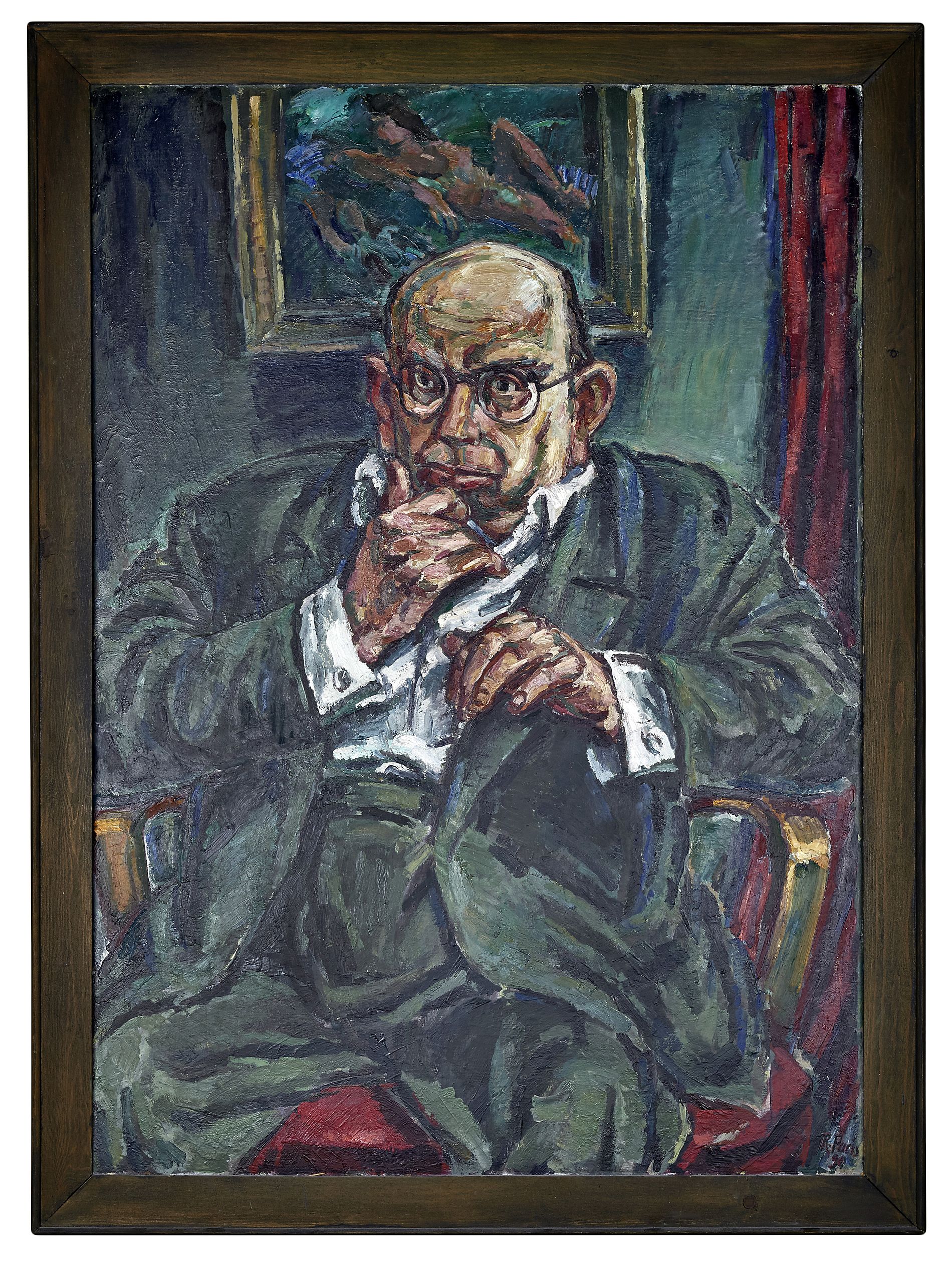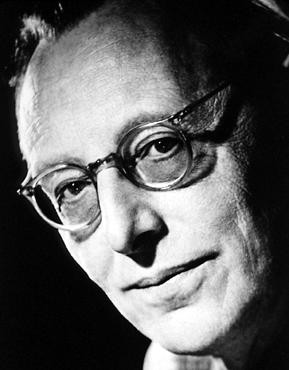This Week in Classical Music: July 24, 2023.Hanns Eislerand Carl Orff, Part III. In the previous two posts, we told the story of two German composers whose lives were upended by the Nazi regime.So what are the legacies of Carl Orff and Hans Eisler?Eisler, as you may recall, spent his last years in East Germany, the Communist country subjugated by the Soviet Union, with an indoctrinated and controlled cultural life.Even though he was GDR’s most famous composer, who wrote the music to the national anthem, Eisler had to live and create according to the Party rules.His more “formalist” music was criticized and much of his output in the last years was populist by design: music for films and choruses and of course for the plays of his dear friend Brecht who was also living in East Germany.But we should remember that Eisler was a committed Marxist who had written propagandist music for years, so the atmosphere of the GDR fitted him better than it probably would any other creative artist.Eisler died in 1968, pretty much forgotten by the West.Then, in 1989, the Berlin Wall fell, the country reunited under the leadership of the Western, democratic part, and Eisler was “rediscovered,” if not with great enthusiasm.Eisler’s music isn’t performed often, even though some of his output is clearly of very high quality.Listen, for example, to his late collection of eight “Serious songs (Ernste Gesänge): it’s absolutely wonderful.(The baritone Günther Leib is accompanied by the Rundfunk-Sinfonie-Orchester Berlin under the direction of Günther Herbig).
Carl Orff, who survived, and quite comfortably, the Nazi regime while not leaving Germany for a day, was investigated by the Americans in 1946 and underwent the denazification process.According to the musicologist Michael Kater, during the process Orff made up some facts, presenting himself in opposition to the Nazi regime.That helped him to receive the classification allowing a return to public life.In Orff’s defense, he never joined the Nazi Party and never held any leadership positions.He was in many respects a compromised figure (he fulfilled Nazi’s commissions by writing the music for the 1936 Olympic games and replacement music for the Midsummer Night’s Dream), but we cannot say that his music in itself was “fascist.”After the war, Orff taught at the Hochschule für Musik in Munich and received many awards.In 1951 he completed the cantata Trionfo di Afrodite, which, with Carmina Burana and Catulli Carmina formed a triptych called Trionfi. The first part of the triptych, Carmina Burana, remains not just Orff’s most popular composition, but one of the most popular music composed in the 20th century.It has been used in dozens of movies and advertisements.Orff is also remembered for his work in music education.His Schulwerk ("School Work") is some of the best music composed for children.
Here’s Catulli Carmina, composed by Orff in 1941-43.The Münchner Rundfunkorchester orchestra and the Mozart-Chor, Linz are conducted by Franz Welser-Möst.
Eisler and Orff, part III, 2023
This Week in Classical Music: July 24, 2023. Hanns Eisler and Carl Orff, Part III. In the previous two posts, we told the story of two German composers whose lives were upended by the Nazi regime. So what are the legacies of Carl Orff and Hans Eisler? Eisler, as you may recall, spent his last years in East Germany, the Communist country subjugated by the Soviet Union, with an indoctrinated and controlled cultural life. Even though he was GDR’s most famous composer, who wrote the music to the national anthem, Eisler had to live and create according to the Party rules. His more “formalist” music was criticized and much of his output in the last years was populist by design: music for films and choruses and of course for the plays of his dear friend Brecht who was also living in East Germany. But we should remember that Eisler was a committed Marxist who had written propagandist music for years, so the atmosphere of the GDR fitted him better than it probably would any other creative artist. Eisler died in 1968, pretty much forgotten by the West. Then, in 1989, the Berlin Wall fell, the country reunited under the leadership of the Western, democratic part, and Eisler was “rediscovered,” if not with great enthusiasm. Eisler’s music isn’t performed often, even though some of his output is clearly of very high quality. Listen, for example, to his late collection of eight “Serious songs (Ernste Gesänge): it’s absolutely wonderful. (The baritone Günther Leib is accompanied by the
Nazi regime. So what are the legacies of Carl Orff and Hans Eisler? Eisler, as you may recall, spent his last years in East Germany, the Communist country subjugated by the Soviet Union, with an indoctrinated and controlled cultural life. Even though he was GDR’s most famous composer, who wrote the music to the national anthem, Eisler had to live and create according to the Party rules. His more “formalist” music was criticized and much of his output in the last years was populist by design: music for films and choruses and of course for the plays of his dear friend Brecht who was also living in East Germany. But we should remember that Eisler was a committed Marxist who had written propagandist music for years, so the atmosphere of the GDR fitted him better than it probably would any other creative artist. Eisler died in 1968, pretty much forgotten by the West. Then, in 1989, the Berlin Wall fell, the country reunited under the leadership of the Western, democratic part, and Eisler was “rediscovered,” if not with great enthusiasm. Eisler’s music isn’t performed often, even though some of his output is clearly of very high quality. Listen, for example, to his late collection of eight “Serious songs (Ernste Gesänge): it’s absolutely wonderful. (The baritone Günther Leib is accompanied by the Rundfunk-Sinfonie-Orchester Berlin under the direction of Günther Herbig).
Rundfunk-Sinfonie-Orchester Berlin under the direction of Günther Herbig).
Carl Orff, who survived, and quite comfortably, the Nazi regime while not leaving Germany for a day, was investigated by the Americans in 1946 and underwent the denazification process. According to the musicologist Michael Kater, during the process Orff made up some facts, presenting himself in opposition to the Nazi regime. That helped him to receive the classification allowing a return to public life. In Orff’s defense, he never joined the Nazi Party and never held any leadership positions. He was in many respects a compromised figure (he fulfilled Nazi’s commissions by writing the music for the 1936 Olympic games and replacement music for the Midsummer Night’s Dream), but we cannot say that his music in itself was “fascist.” After the war, Orff taught at the Hochschule für Musik in Munich and received many awards. In 1951 he completed the cantata Trionfo di Afrodite, which, with Carmina Burana and Catulli Carmina formed a triptych called Trionfi. The first part of the triptych, Carmina Burana, remains not just Orff’s most popular composition, but one of the most popular music composed in the 20th century. It has been used in dozens of movies and advertisements. Orff is also remembered for his work in music education. His Schulwerk ("School Work") is some of the best music composed for children.
Here’s Catulli Carmina, composed by Orff in 1941-43. The Münchner Rundfunkorchester orchestra and the Mozart-Chor, Linz are conducted by Franz Welser-Möst.